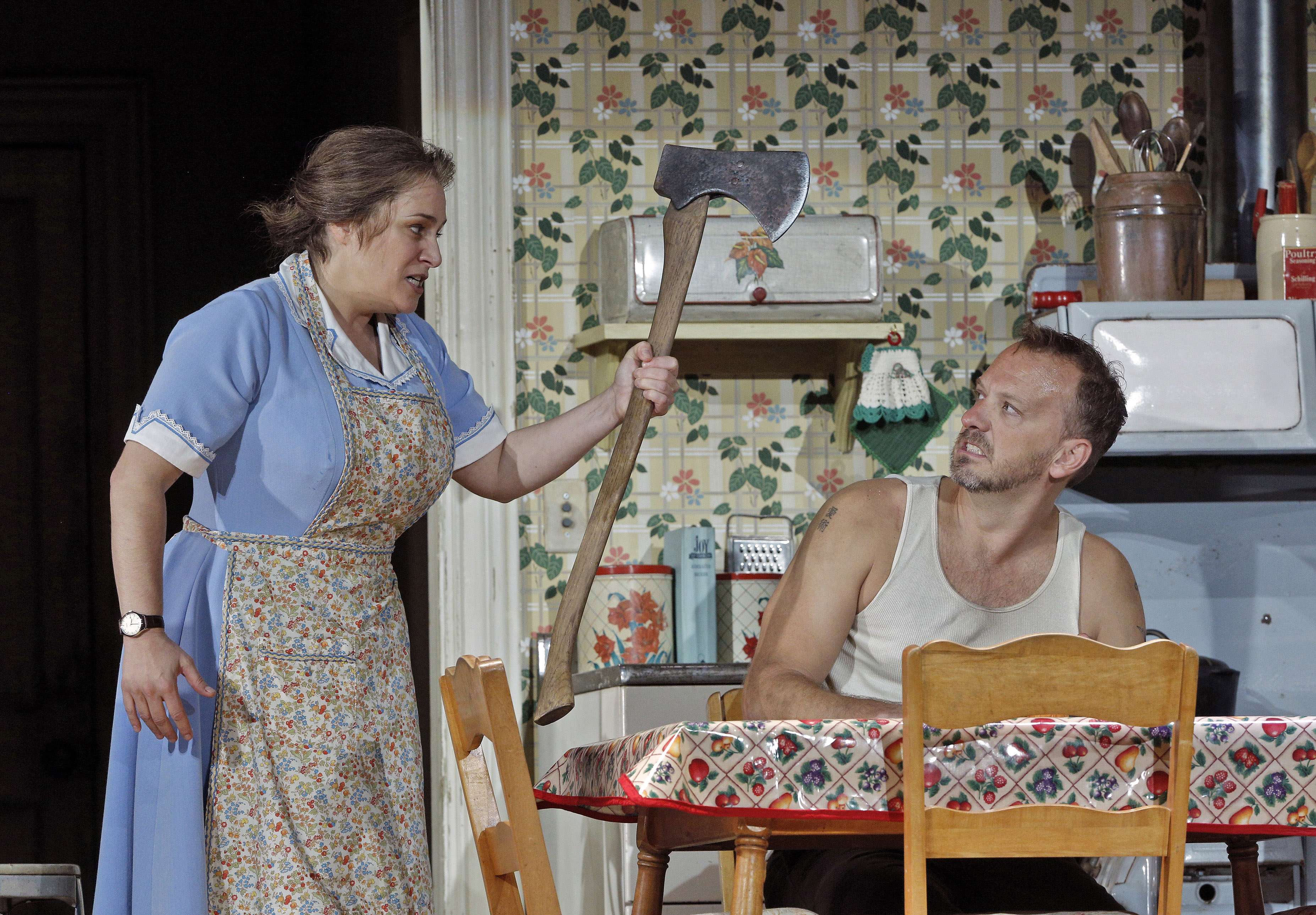|
Back
The Passion of Dolores San Francisco
War Memorial Opera House
09/18/2013 - & September 22*, 25, 28, October 1, 4, 2013
Tobias Picker: Dolores Claiborne
Patricia Racette (Dolores Claiborne), Susannah Biller (Selena St. George), Elizabeth Futral (Vera Donovan), Wayne Tiggs (Joe St. George), Greg Fedderly (Detective Thibodeau), Joel Sorensen (Mr. Pease), Robert Watson (Mr. Cox), A. J. Glueckert (Mr. Knox), Hadleigh Adams (Mr. Fox), Renée Rapier, Nikki Einfeld, Marina Harris, Laura Krumm, Jacqueline Piccolino (maids)
San Francisco Opera Orchestra, George Manahan (conductor), San Francisco Opera Chorus, Ian Robertson (director)
James Robinson (director), Allen Moyer (set designer), Greg Emetaz (projection designer), James Schuette (costume designer), Christopher Akerlind (lighting designer), Lisa Anderson (stage manager), Gerd Mairandres (wig and makeup designer), J. D. McClatchy (librettist) 
P. Racette & W. Tiggs (© Cory Weaver)
General Director David Gockley's newly-commissioned opera, Dolores Claiborne, is a curiosity. Based upon the book by Stephen King, and a departure from his customary supernatural plots, the story is nevertheless populated with sinister characters who portray nuanced aspects of good and evil. The pleasure of this production comes from the performers' excellent singing as well as a skillful production. Unfortunately, this is insufficient consolation for Tobias Picker's somewhat disappointing score and Sandy McClatchy's disjointed, perplexing libretto.
To be impoverished, ill-educated, unattractive, greying, and essentially employed as a servant, only to then be bullied by a lout of a wife-beating, child-molesting husband, is every woman's nightmare. A personality sketch such as this implies a weak, cowering, powerless victim lacking the will or ability to defend herself or change her circumstances. Such is the existence of millions of women.
Yet beware the mother whose child is threatened or harmed. No longer is the diminutive female powerless and resigned. Masculine brawn is no match for maternal rage. Here is the answer to what drives Dolores Claiborne.
Without exception, the entire cast delivers exceptionally fine performances. Lyric spinto soprano Patricia Racette, cast in a mezzo-soprano role, is especially notable as the eponymous anti-hero, drawing upon her celebrated dramatic gifts to render believable her character's unpredictably drastic, climactic act. (Note: Thanks to Ms. Racette 's expansive range and formidable discipline, she was obligated to sing this mezzo-soprano part, and with a mere three weeks of preparation, after Dolora Zajick bowed out due to health problems.) If at times Ms. Racette's euphony lacks a certain vigor at the lowest mezzo tessitura, no forgiveness is necessary, especially given the composer's eccentric proclivity for creating melodies requiring frequent visits to vocal range extremes.
Soprano Susannah Biller, as the ungrateful daughter Selena, is relieved by, but castigates, her mother's violence, yet enjoys the education funded by her mother's savings. Ms. Biller possesses a roundness of strength that is never harsh, and Selena's poignant eclipse aria is a magnificent display of the developing complexity of her voice.
Especially refreshing is the appearance of lyric coloratura soprano Elizabeth Futral, although it is not clear why the role of Vera Donovan was magnified, given its minor contribution to the plot. No complaints here, though, since it is always a treat to listen to Ms. Futral's nuanced, expressive talent.
The brutish Joe St. George is lustfully portrayed by bass-baritone Wayne Tiggs. Joe's reprehensible rape of his school-age daughter is musically announced by a simple, limited-range, sing-song chant, the lyrics of which are not so much sinister as at best weird, at worst vulgar.
Tenor Greg Fedderly, depicting Detective Thibodeau, does the best he can with a weak script, although his honeyed timbre contributes dimension to his character.
The supporting cast is polished and animated. The ensemble includes Joel Sorensen as Mr. Pease, the banker, Robert Watson, Hadleigh Adams, A. J. Glueckert, respectively, as Messrs. Cox, Fox and Knox, and the housemaids Renée Rapier, Nikki Einfeld, Marina Harris, Laura Krumm and Jacqueline Piccolino.
George Manahan, in his premier performance with the company, nimbly conducts a responsive orchestra in spite of the intellectually affected manuscript. Mr. Picker's use of leitmotifs, coyly constructed with the characters' initials, is largely wasted except for the listener with perfect pitch, and such a contrivance does not create a particularly beautiful melody. The unfortunate consequence is a fragmented, at times almost random, melodic line that can only be supported with bland harmonics. How the singers make this music sound lovely is the secret of the interpreter's genius; that is, the ability to enchant the listener while concealing a weakness of composition. Thus, sopranos Biller and Futral skillfully avoid screeching notes in the score's extreme upper register.
No fault is to be found with James Robinson's production, especially as enhanced with realistic film projections by Greg Emetaz and the well-crafted sets of Allen Moyer. Using the interrogation scene as a framing device lends clever continuity to the frequent swaps of place and time.
It is unclear whether this operatic effort is one for the ages, despite its universal mother/daughter theme. Perhaps with some revisions, especially to the libretto, Dolores Claiborne deserves the perspective of a second production.
Claudia K. Nichols
|